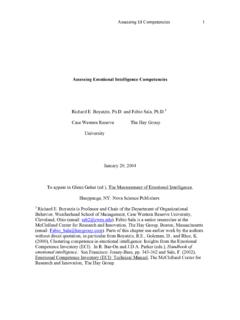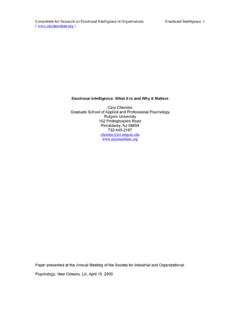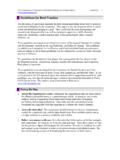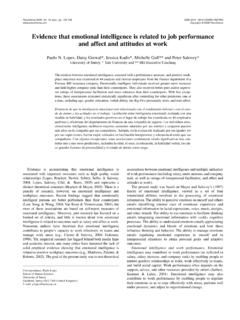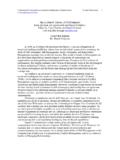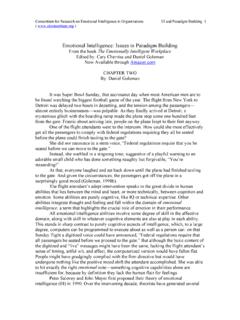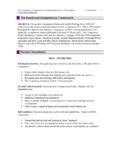Transcription of EI Issues And Common Misunderstandings
1 The Consortium for Research on emotional intelligence in Organizations Issues in EI ( ) 1 emotional intelligence : Issues AND Common Misunderstandings Written by: Robert J. Emmerling, And Daniel Goleman, Consortium for Research on emotional intelligence in Organizations October, 2003 Comments related to this article can be posted to the website of the Consortium for Research on emotional intelligence in Organizations. Please see for additional details. The Consortium for Research on emotional intelligence in Organizations Issues in EI ( ) 2 emotional intelligence : Issues and Common Misunderstandings In this article we seek to raise Issues and air questions that have arisen along with the growing interest in emotional intelligence .
2 We hope to catalyze a dialogue among all those with serious interests in the area, to surface hidden assumptions, correct mistaken impressions, and survey a range of opinions. Such open dialogue, we believe, can pay off to the degree it strengthens the research and thinking that are the foundations of the field both in theory and in applications. The influence of emotional intelligence on popular culture and the academic community has been rapid and widespread. While this has stimulated a surprising number or research initiatives across a wide range of domains within psychology, the swiftness with which the concept of emotional intelligence has caught on perhaps inevitably created a gap between what we know and what we need to know.
3 Understandably, this has led to a great deal of controversy and debate among researchers and practitioners eager to understand and apply the principles associated with emotional intelligence . Such debate, of course, is not confined to emotional intelligence , but is an inherent part of the process of theory development and scientific discovery in any field. Research and theory on emotions has waxed and waned over the history of psychology. The behavior revolution inspired by B. F. Skinner and the subsequent The Consortium for Research on emotional intelligence in Organizations Issues in EI ( ) 3cognitive revolution saw interest in emotion seriously undermined.
4 However, beginning in the 1980s and accelerating into the present, interest in emotions has enjoyed a robust resurgence across a wide range of subdisciplines within psychology, neuroscience, and the health sciences especially the renewed focus on positive psychology, well-being, and mind/body medicine. While such research continues to expand our knowledge of emotions, fundamental questions remain regarding emotional intelligence . We seek to raise important questions and Issues for the field. The questions we address include: What is emotional intelligence (EI)? How is it different from other established constructs within psychology?
5 Is it possible to develop EI? Is EI a better predictor of work performance than traditional measures of intelligence or, more precisely, which kinds of work performance does EI predict most strongly? Should EI be measured at all? Finally, what is the relationship between ethics and EI? All of these are legitimate questions, and each has been raised by many voices in the field. In this article we seek to add to the ongoing dialogue by clarifying our own position, and helping to differentiate and sharpen the Issues . We also seek to address some Common claims about emotional intelligence that may foster consequential, even unfortunate Misunderstandings .
6 As Kuhn (1970) notes, scientists efforts to deal with data in a systematic fashion, guided by deeply held theories, lead to the formation of distinct research paradigms. Each of these paradigms has its own unique history, methods, and assumptions for dealing with its focal topic, and, in this sense, the emotional intelligence paradigm is no different than other paradigms within psychology. According to Kuhn (1970), such a scientific paradigm becomes an object for further articulation and specification under The Consortium for Research on emotional intelligence in Organizations Issues in EI ( ) 4new and more stringent conditions.
7 Once models and paradigms have been articulated, the signs of scientific vigor include, the proliferation of competing articulations, the willingness to try anything, the expression of explicit discontent, the recourse to philosophy and to debate over fundamentals ( ). The current debates and vigorous research efforts in the area of emotional intelligence suggests just this state of affairs; by Kuhn s criteria, the emotional intelligence paradigm would seem to have reached a state of scientific maturity (Goleman, 2001). As paradigms mature, specific theories within the paradigm begin to emerge and differentiate, as has occurred since the first formal formulation of an emotional intelligence theory by Peter Salovey and John Mayer in 1990.
8 All these new variations on their theme like the original theory must be held to Karl Popper s test: A new theory can be justified if it has the potential to explain things that other theories cannot, or if it has the potential to explain things better than other competing theories. Any new theory must lead to testable hypotheses which will allow it to be compared with other theories, with the goal of determining whether the theory would constitute a scientific advance should it survive in light of research aimed at testing its specific hypotheses (Popper, 1959). Moreover, if such a theory is able to withstand rigorous tests of its validity, the question then becomes one of application.
9 Can such a theory be applied without giving rise to inconsistencies? Will such a theory help us to achieve some useful purpose? Is such a theory really needed at all? (Popper, 1959). If a theory can pass these crucial tests, then the theory can be compared with other competing theories to see if the current theory represents a replacement or extension of theories currently in use. The Consortium for Research on emotional intelligence in Organizations Issues in EI ( ) 5 Predictive Validity of emotional intelligence in the Workplace Perhaps central to the current interest in emotional intelligence is its potential utility in predicting a range of criterion across disparate populations.
10 As with claims associated with traditional intelligence , the predictive validity of emotional intelligence will likely vary widely depending on the context, criterion of interest, and specific theory used. Traditional measures of intelligence , although providing some degree of predictive validity, have not been able to account for a large portion of the variance in work performance and career success. As Goleman (1998, p. 19) states, When IQ test scores are correlated with how well people perform in their careers the highest estimate of how much difference IQ accounts for is about 25 percent (Hunter & Hunter, 1984; Schmidt & Hunter, 1981).
